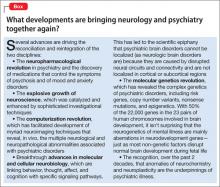A century ago, neurology and psychiatry were one specialty, with unified training, a unified journal (Archives of Neurology and Psychiatry), and a unified board exam through the American Board of Psychiatry and Neurology.1-3 Kraepelin, Alzheimer, Freud, and Meyer were all neuropsychiatrists who treated patients with all brain disorders—stroke, epilepsy, tertiary syphilis, psychosis, depression, and anxiety. Disorders of the “mind,” such as emotions, thought, or behavior, were rightfully regarded as manifestations of cerebral pathology, and research was based on that model.
That was the rational era, when disorders of the brain and its mind were integrated into one specialty.
Why did psychiatry and neurology drift apart?
Two answers to this question come to mind: 1) Freudian theory and psychoanalysis and 2) the inability to localize the brain “lesion” associated with psychiatric disorders.
Although Freud was a neurologist and psychiatrist, his psychodynamic formulation of human behavior was more speculative than empirical, and his psychoanalytic theory was not evidence-based (to be fair, almost all neurologic disorders lacked any treatment 100 years ago). Furthermore, neuropsychiatry did not have the sophisticated brain assessment tools that are available today to physically localize disorders of thought, affect, or mood in the brain. Knowledge of neurochemistry, receptors, neurotransmitters, and brain circuits was nonexistent—let alone an understanding of molecular and cellular neurobiology. The “mind” was therefore divorced, so to speak, from its physical foundation, the brain, and mental illness was erroneously re-conceptualized as “psychological,” not neurological!
In the 1950s, the American Medical Association’s Archives of Neurology and Psychiatry was split into Archives of Neurology and Archives of General Psychiatry. Since then, the two specialties have drifted apart and reduced to a minimum the overlap of their clinical, educational, and research emphases. Much has been lost over the past five decades because of the rupture of diseases of the human brain from diseases of the mind, which includes the most advanced functions of that brain.
The pendulum is swinging back
We are at a point at which advances in understanding of the neurological roots of mental disorders show that psychiatry is as much anchored in the brain as its sister specialty neurology is.4-7 See the box for a list of reasons that explain why the reconciliation and reintegration of neurology and psychiatry are accelerating.
Scientific progress has essentially nullified the reasons that led to the separation of psychiatry and neurology. The road to reintegration is littered with obstacles, however—not the least of which is the stubborn “turfishness” that accumulated over decades of alienation. Clinicians and academicians on both sides are entrenched in their habits and beliefs, and will resist changes to their practice and cherished conceptual models. Why? Bridging the chasm will require new clinical training and revisions to educational and residency curricula.
I believe that the majorities on both sides of the chasm understand the merits of abandoning the fallacious dualism of brain and mind and of merging the two disciplines into the neuropsychiatric specialty that our revered founders upheld and practiced. In fact, neuropsychiatry and behavioral neurology disciplines, which emerged in the 1980s, represent the bridges that recognize the cerebral basis of psychiatric disorders and the psychiatric consequences of neurologic lesions.
Just as all ophthalmologists train as ophthalmologists and then subspecialize into corneal specialists, cataract specialists, vitreoretinal specialists, or neuro-ophthalmologists, so can psychiatrists and neurologists train in neuropsychiatry and then subspecialize to become epileptologists, psychosis specialists, vascular neurologists/neurointensivists, mood disorders specialists, neuromuscular specialists, anxiety experts, and so on. Patients will benefit, because every psychiatric patient deserves a full neurological assessment and treatment and every neurologic patient deserves a full psychiatric assessment and treatment.
The unification of diseases of the brain and diseases of the mind will lead to a higher quality of care and will diminish the stigma of mental illness. In addition, novel strategies for brain repair will advance therapeutics for all brain disorders. Because neuropsychiatric disorders are the leading cause of burden of disease worldwide, early recognition and intervention, as well as prevention, are top public health priorities.
Call to action
The time has come to tear down the silos of neurology and psychiatry and reunify the disciplines, as they were 100 years ago.8 Forward-thinking medical schools should seriously consider this initiative and start moving to consolidate clinical brain disorders and mind disorders into one department. The American Board of Psychiatry and Neurology (which, fortunately, remained integrated during the decades of separation) would then revert to the days when board exam candidates were assessed on neurologic and psychiatric patients—as I was, when I sat for my oral boards.


